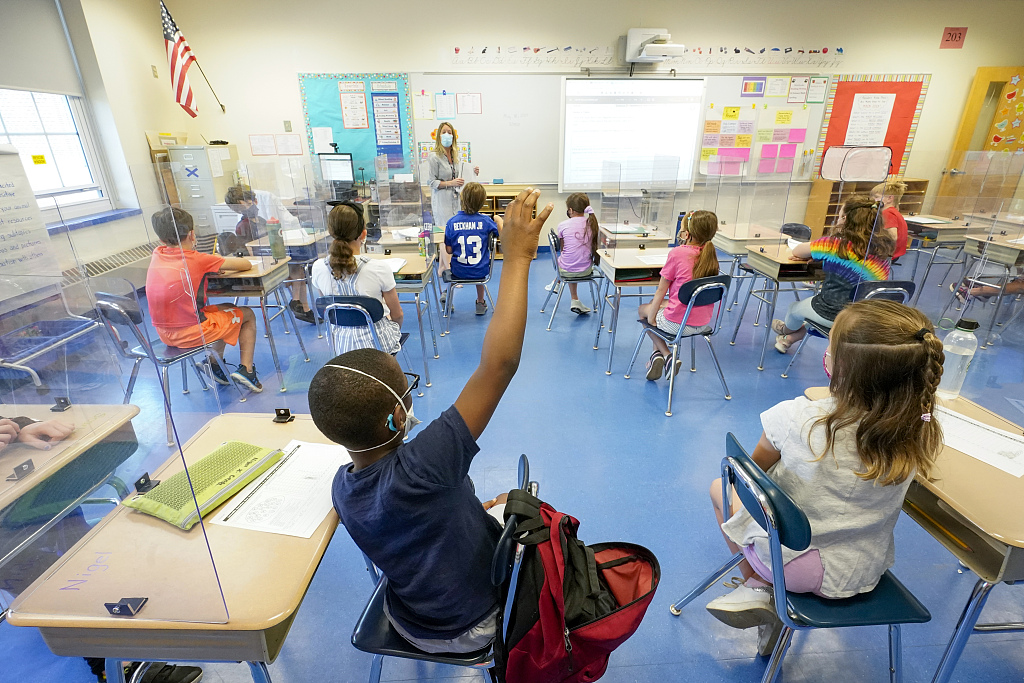
Medical workers honor the hundreds of nurses who have lost their lives on the frontline of COVID-19 in front of the White House in Washington, D.C., May 12, 2021. /CFP
Medical workers honor the hundreds of nurses who have lost their lives on the frontline of COVID-19 in front of the White House in Washington, D.C., May 12, 2021. /CFP
America's workers have been quitting their jobs at a historic rate since the spring of 2021, leaving many industries struggling with labor shortages. The crunch is being acutely felt in healthcare and education.
About half a million healthcare workers – nearly one in five in the U.S. have quit their jobs since the COVID-19 pandemic began, according to the U.S. Bureau of Labor Statistics.
A report in the Atlantic revealed that the reasons doctors and nurses are leaving in droves include being too traumatized to work anymore, suffering from long-term side effects after contracting COVID-19 and feeling unappreciated for what they had endured. Meanwhile, others have been laid off.
Many healthcare workers told the Atlantic the final straw was not the virus per se, but the disappointment with how their employers responded to it and having to work under strenuous conditions with little say and inadequate pay.
As one emergency room doctor told the Atlantic, the hospital leadership "never acknowledged what we went through," as she cared for patients who "seemed to forget their humanity."
More resignations could be on the horizon. A Morning Consult survey showed 31 percent of the remaining healthcare workforce have considered leaving, and this number rises to 66 percent among acute and critical care nurses, according to the American Association of Critical-Care Nurses.
Medical workers in the U.S. were running low on personal protective equipment from the start of the COVID-19 pandemic. The rollout of vaccines initially brought hope for an end to the pandemic, but hospitals around U.S. became overwhelmed yet again with the spread of the Delta variant and the relaxing of mask requirements.
Read more: U.S. Healthcare Worker: I had to quit my job during the pandemic

A teacher and her third-grade students wear face masks during a class at a school in Rye, New York, May 18, 2021. /CFP
A teacher and her third-grade students wear face masks during a class at a school in Rye, New York, May 18, 2021. /CFP
The pandemic has also triggered a teacher exodus, and many schools across the country are struggling to stay open when teachers take days off or have to enter quarantine. Some schools have reportedly switched to virtual learning.
Fueled by the crunch, the demand for substitute teachers has soared, and some schools had to lower their hiring standards to fill the vacancies, the New York Times reported.
In the last month, at least two states, Missouri and Oregon, temporarily removed their college degree requirements for teachers, said the New York Times.
While some educators worry about a deterioration of education quality, they have also warned of a continuing shortage of teachers after the pandemic.
"It's a problem that existed pre-pandemic; it has been exacerbated by the pandemic, and the teacher shortage will not disappear with the pandemic," said Michael Rice, Michigan's state superintendent of public instruction.
According to the latest job figures, there were 575,000 fewer local and state education employees in October 2021 than in February 2020 in the U.S. A net 65,000 public education employees left the industry between September and October alone, the Bureau of Labor Statistics showed.

